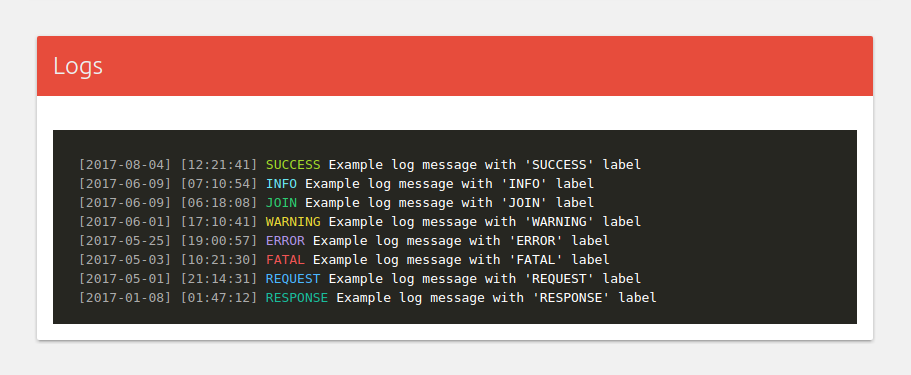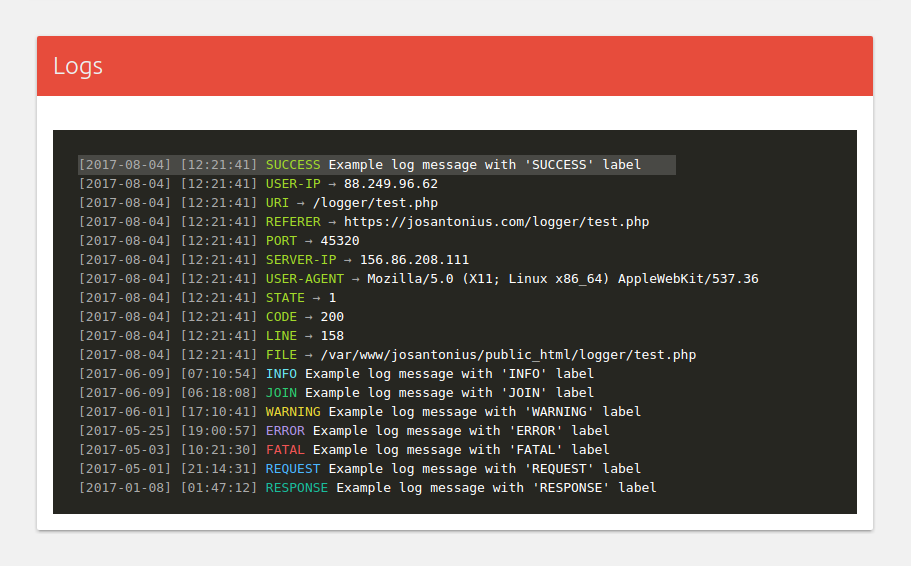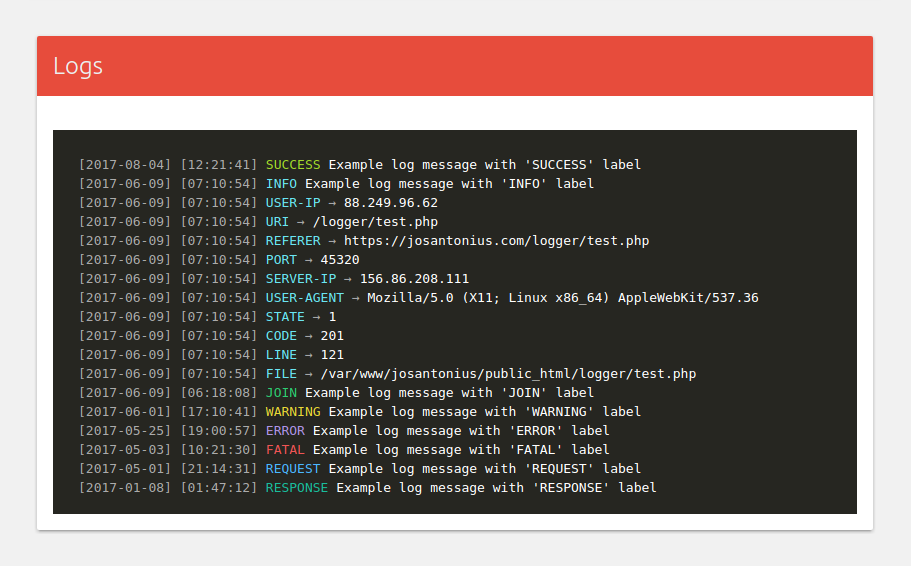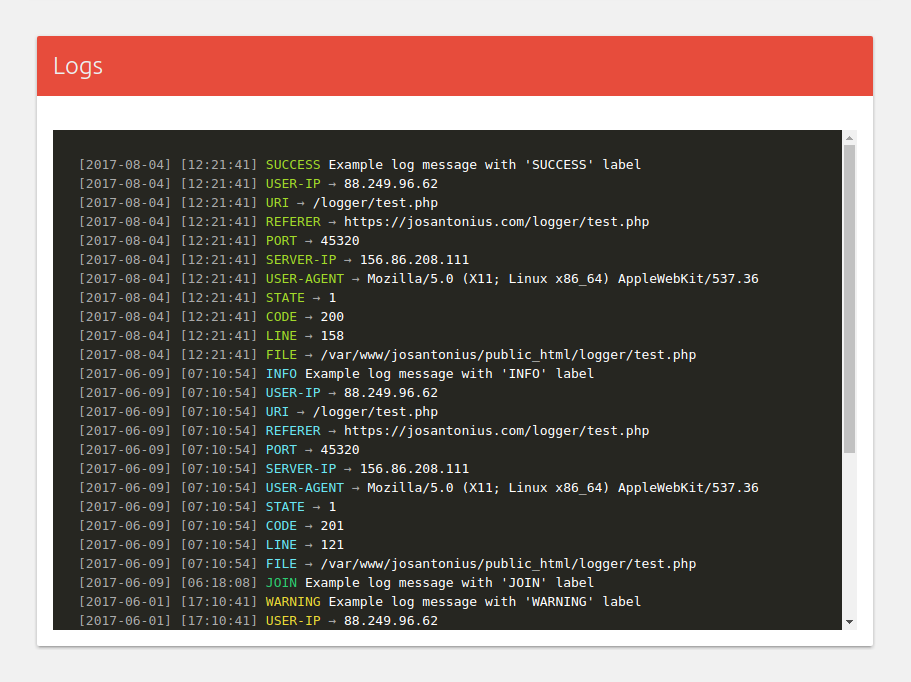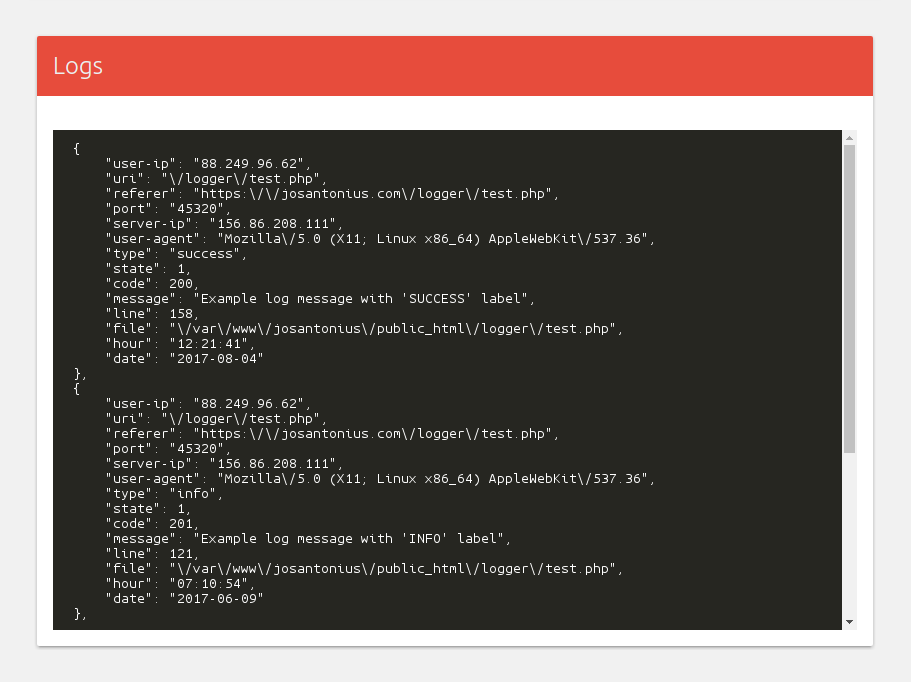josantonius / logger
Php library to create logs easily and store them in Json format.
Fund package maintenance!
Josantonius
Installs: 230
Dependents: 0
Suggesters: 0
Security: 0
Stars: 5
Watchers: 4
Forks: 5
Open Issues: 0
pkg:composer/josantonius/logger
Requires
- php: ^5.6 || ^7.0
- josantonius/json: ^1.1.5
Requires (Dev)
- friendsofphp/php-cs-fixer: ^2.3 || ^2.8
- phpmd/phpmd: ^2.6
- phpunit/phpunit: ^5.7 || ^6.0
- squizlabs/php_codesniffer: ^3.0
README
Php library to create logs easily and store them in Json format.
- Requirements
- Installation
- Available Methods
- Quick Start
- Available Methods
- Usage
- Tests
- Sponsor
- License
Requirements
This library is supported by PHP versions 5.6 or higher and is compatible with HHVM versions 3.0 or higher.
Installation
The preferred way to install this extension is through Composer.
To install PHP Logger library, simply:
composer require Josantonius/Logger
The previous command will only install the necessary files, if you prefer to download the entire source code you can use:
composer require Josantonius/Logger --prefer-source
You can also clone the complete repository with Git:
$ git clone https://github.com/Josantonius/PHP-Logger.git
Or install it manually:
wget https://raw.githubusercontent.com/Josantonius/PHP-Logger/master/src/Logger.php
wget https://raw.githubusercontent.com/Josantonius/PHP-Json/master/src/Json.php
Images
Available Methods
Available methods in this library:
- Initiator for site debug management
new Logger($path, $filename, $logNumber, $ip, $states);
| Atttribute | Description | Type | Required | Default |
|---|---|---|---|---|
| $path | Path name to save file with logs. | string | No | null |
| $filename | JSON file name that will save the logs. | string | No | null |
| $logNumber | Maximum number of logs to save to file. | int | No | 200 |
| $ip | If you want to get to another library. | string | No | null |
| $states | Different states for logs. | array | No | null |
# Return (void)
- Save log line
Logger::save($type, $code, $msg, $line, $file, $data);
| Atttribute | Description | Type | Required | Default |
|---|---|---|---|---|
| $type | Error type or warning. | string | Yes | |
| $code | HTTP response status code. | int | Yes | |
| $message | Message. | string | Yes | |
| $line | Line from which the save is executed. | int | Yes | |
| $file | Filepath from which the method is called. | string | Yes | |
| $data | Extra custom parameters. | array | No | 0 |
# Return (boolean)
- Save logs to Json file
Logger::store();
# Return (boolean)
- Get saved logs
Logger::get();
# Return (array) → logs saved
- Define directory for scripts and get url from file
Logger::script($url);
| Atttribute | Description | Type | Required | Default |
|---|---|---|---|---|
| $url | File url. | string | Yes |
# Return (string) → file url
- Define directory for styles and get url from file
Logger::style($url);
| Atttribute | Description | Type | Required | Default |
|---|---|---|---|---|
| $url | File url. | string | Yes |
# Return (string) → file url
- Get number of logs added in the current section
Logger::added();
# Return (int) → logs added in the current section
- Display logger section
Logger::render();
# Return (boolean true)
- Reset parameters
Logger::reset();
# Return (boolean true)
Quick Start
To use this library with Composer:
require __DIR__ . '/vendor/autoload.php'; use Josantonius\Logger\Logger;
Or If you installed it manually, use it:
require_once __DIR__ . '/Logger.php'; require_once __DIR__ . '/Json.php'; use Josantonius\Logger\Logger;
Usage
Example of use for this library:
- Basic example
<?php require __DIR__ . '/vendor/autoload.php'; use Josantonius\Logger\Logger; new Logger(); Logger::save('SUCCESS', 100, 'msg', __LINE__, __FILE__); Logger::save('JOIN', 200, 'msg', __LINE__, __FILE__); Logger::save('INFO', 300, 'msg', __LINE__, __FILE__); Logger::save('WARNING', 400, 'msg', __LINE__, __FILE__); Logger::save('ERROR', 500, 'msg', __LINE__, __FILE__); Logger::save('FATAL', 600, 'msg', __LINE__, __FILE__); Logger::save('REQUEST', 700, 'msg', __LINE__, __FILE__); Logger::save('RESPONSE', 800, 'msg', __LINE__, __FILE__); Logger::storeLogs();
- Advanced example
<?php require __DIR__ . '/vendor/autoload.php'; use Josantonius\Logger\Logger; $states = [ 'global' => true, 'exception' => true, 'error' => false, 'notice' => false, 'fatal' => true, ]; new Logger('/logger/', 'logs', 600, '58.80.84.44', $states); Logger::save('EXCEPTION', 400, 'msg', __LINE__, __FILE__); Logger::save('ERROR' , 402, 'msg', __LINE__, __FILE__); Logger::save('NOTICE', 100, 'msg', __LINE__, __FILE__); $params = [ 'id-user' => 68, 'name-user' => 'Joe' ]; Logger::save('FATAL, 500, 'msg', __LINE__, __FILE__, $params); Logger::storeLogs(); echo 'Logs added: ' . Logger::added(); echo 'Logs added: ' . count(Logger::get); printf('<link href="%s">', Logger::style('http://site.com/public/css/')); printf('<script src="%s">', Logger::script('http://site.com/public/js/')); Logger::render();
Tests
To run tests you just need composer and to execute the following:
git clone https://github.com/Josantonius/PHP-Logger.git
cd PHP-Logger
composer install
Run unit tests with PHPUnit:
composer phpunit
Run PSR2 code standard tests with PHPCS:
composer phpcs
Run PHP Mess Detector tests to detect inconsistencies in code style:
composer phpmd
Run all previous tests:
composer tests
Sponsor
If this project helps you to reduce your development time, you can sponsor me to support my open source work 😊
License
This repository is licensed under the MIT License.
Copyright © 2017-2022, Josantonius

